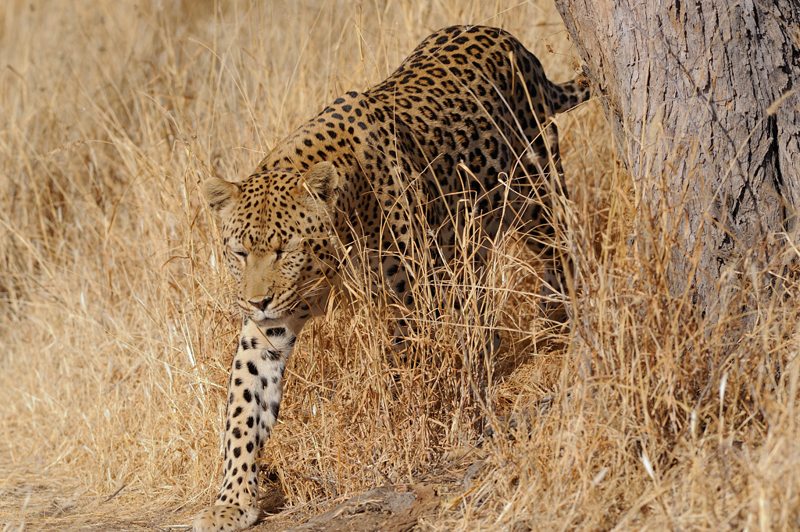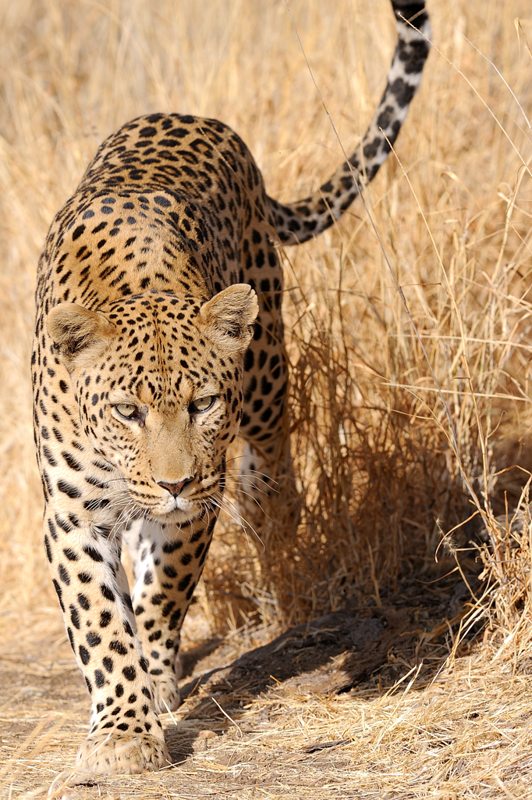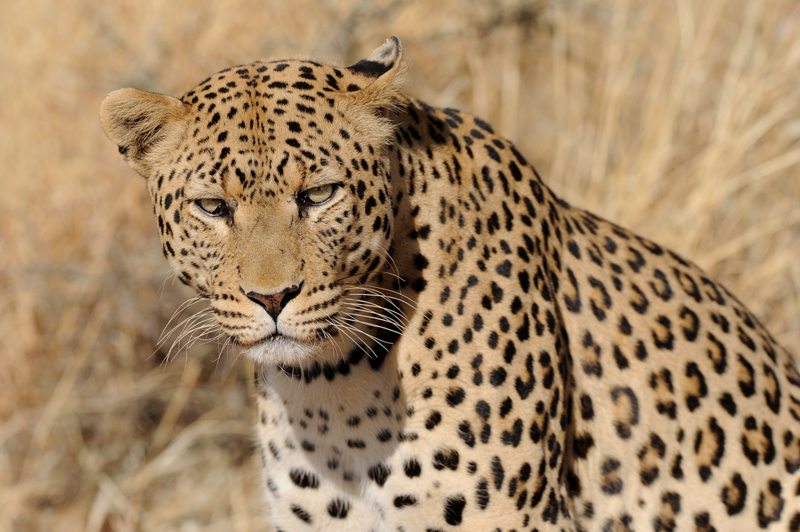Leopard
- Flutterby
- Posts: 44029
- Joined: Sat May 19, 2012 12:28 pm
- Country: South Africa
- Location: Gauteng, South Africa
- Contact:
Re: Leopard
Future may not look too rosy for pink leopard
22/03/2016
SKUKUZA – “Leopards are elusive but when you do see one, it is as if you have hit the jackpot,” said Ms Tara Pirie who tabled a report at the Savanna Science Meeting held in the Kruger National Park earlier this month.
Pirie is a researcher with a special interest in leopards. During a specialist project she found a unique coloured leopard in the Lydenburg area, a strawberry coloured one with brown spots.
She researched the question if small commercial reserves can contribute to leopard conservation in South Africa and used the Thabo Tholo Wilderness Reserve game farm in the Lydenburg district as her area of study.
She is a member of the Ingwe Leopard Research Group and a doctoral researcher with the University of Reading, UK.
“I love the independence and strength of leopards. When a big cat like that walks towards me, I still get goosebumps all over! People are always so surprised how small they are, but it is part of why they are so excellent at hiding. They are the Houdinis of the animal world.”
Pirie came from the UK 11 years ago to train as a field guide after she had been a zookeeper in the north of England. “I could not resist the call of the wild.” Originally she planned on only staying for a year but quickly made her mark and became head field guide in Madikwe Game Reserve in North West.
In the three years she did guiding in the Waterberg she saw six leopards. When the Internet-based television programme Wild Earth Safari TV (“the Internet’s best-kept secret!”) made her an offer of doing safaris seen in real time on the Internet by a worldwide audience, she grabbed the opportunity.
For her research study Pirie joined hands with donors who subscribed to a camera club and they sponsored over 50 camera traps.
These traps were used over a period of three years to capture data on the movement of the leopards in and around Thaba Tholo. Identification kits based on unique spot patterns of leopards were used.
She found that most published research on these cats in South Africa have been conducted within large protected game reserves.
Little is known about populations residing outside government protected areas. She concluded that long-term monitoring within small privately owned reserves can produce important information needed for the management of local populations of leopards.
During her research Pirie and her team identified two leopards that were strawberry coloured with brown rosettes instead of black.
Of these so-called erythristic leopards there are 12 in the world of which five were found in the area she researched.
“This colour variant has been seen in the African leopard since the late 1990s as far as we are aware. This could be a warning that inbreeding has occurred in this area which could cause problems for the population in the future. More research is needed to confirm this for sure.”
Pirie pointed out that the potential legal and illegal removal of leopards could have reduced genetic variation within the local population. Thaba Tholo is surrounded by livestock and agricultural land.
One of Pirie’s main goals were to use the research to establish better relationships with farmers. “I want farmers to know that I understand problem animals can impact their earning a living. As a conservationist I understand wanting to remove these problem animals. I also believe that hunters can be conservationists.”
Pirie would like to see management measures taken outside reserves to save leopard populations like introducing Anatolian shepherd dogs to protect herds of livestock. “The courage of these dogs to deal with predators is legendary. We need to work with farmers with measures like these so that they can be more tolerant of having carnivores near their farms.”
She remarked that the ban imposed earlier this year on trophy hunting of leopards in South Africa gave breathing space to conservationists working with leopards to specify the biggest challenges in saving these cats.
CITES allocated 150 permits for leopards to be hunted in South Africa this year. “We need to know what will happen to the total leopard population if we take 150 out of the total population in SA. At present we do not have that knowledge.”
Ingwe Leopard Research’s ideal is to bring the 39 leopard conservationist organisations together so that their collaboration can work to the benefit of all. She concurred that technology like camera traps and collars can help to open up research and help in the understanding of the challenges facing conservation. “Like with a camera club it is a good way of involving interested groups.”
22/03/2016
SKUKUZA – “Leopards are elusive but when you do see one, it is as if you have hit the jackpot,” said Ms Tara Pirie who tabled a report at the Savanna Science Meeting held in the Kruger National Park earlier this month.
Pirie is a researcher with a special interest in leopards. During a specialist project she found a unique coloured leopard in the Lydenburg area, a strawberry coloured one with brown spots.
She researched the question if small commercial reserves can contribute to leopard conservation in South Africa and used the Thabo Tholo Wilderness Reserve game farm in the Lydenburg district as her area of study.
She is a member of the Ingwe Leopard Research Group and a doctoral researcher with the University of Reading, UK.
“I love the independence and strength of leopards. When a big cat like that walks towards me, I still get goosebumps all over! People are always so surprised how small they are, but it is part of why they are so excellent at hiding. They are the Houdinis of the animal world.”
Pirie came from the UK 11 years ago to train as a field guide after she had been a zookeeper in the north of England. “I could not resist the call of the wild.” Originally she planned on only staying for a year but quickly made her mark and became head field guide in Madikwe Game Reserve in North West.
In the three years she did guiding in the Waterberg she saw six leopards. When the Internet-based television programme Wild Earth Safari TV (“the Internet’s best-kept secret!”) made her an offer of doing safaris seen in real time on the Internet by a worldwide audience, she grabbed the opportunity.
For her research study Pirie joined hands with donors who subscribed to a camera club and they sponsored over 50 camera traps.
These traps were used over a period of three years to capture data on the movement of the leopards in and around Thaba Tholo. Identification kits based on unique spot patterns of leopards were used.
She found that most published research on these cats in South Africa have been conducted within large protected game reserves.
Little is known about populations residing outside government protected areas. She concluded that long-term monitoring within small privately owned reserves can produce important information needed for the management of local populations of leopards.
During her research Pirie and her team identified two leopards that were strawberry coloured with brown rosettes instead of black.
Of these so-called erythristic leopards there are 12 in the world of which five were found in the area she researched.
“This colour variant has been seen in the African leopard since the late 1990s as far as we are aware. This could be a warning that inbreeding has occurred in this area which could cause problems for the population in the future. More research is needed to confirm this for sure.”
Pirie pointed out that the potential legal and illegal removal of leopards could have reduced genetic variation within the local population. Thaba Tholo is surrounded by livestock and agricultural land.
One of Pirie’s main goals were to use the research to establish better relationships with farmers. “I want farmers to know that I understand problem animals can impact their earning a living. As a conservationist I understand wanting to remove these problem animals. I also believe that hunters can be conservationists.”
Pirie would like to see management measures taken outside reserves to save leopard populations like introducing Anatolian shepherd dogs to protect herds of livestock. “The courage of these dogs to deal with predators is legendary. We need to work with farmers with measures like these so that they can be more tolerant of having carnivores near their farms.”
She remarked that the ban imposed earlier this year on trophy hunting of leopards in South Africa gave breathing space to conservationists working with leopards to specify the biggest challenges in saving these cats.
CITES allocated 150 permits for leopards to be hunted in South Africa this year. “We need to know what will happen to the total leopard population if we take 150 out of the total population in SA. At present we do not have that knowledge.”
Ingwe Leopard Research’s ideal is to bring the 39 leopard conservationist organisations together so that their collaboration can work to the benefit of all. She concurred that technology like camera traps and collars can help to open up research and help in the understanding of the challenges facing conservation. “Like with a camera club it is a good way of involving interested groups.”
Re: Leopard



Dewi
What is the good of having a nice house without a decent planet to put it on? (H D Thoreau)
What is the good of having a nice house without a decent planet to put it on? (H D Thoreau)
- Lisbeth
- Site Admin
- Posts: 65591
- Joined: Sat May 19, 2012 12:31 pm
- Country: Switzerland
- Location: Lugano
- Contact:
Re: Leopard
Bello!! 

"Education is the most powerful weapon which you can use to change the world." Nelson Mandela
The desire for equality must never exceed the demands of knowledge
The desire for equality must never exceed the demands of knowledge
- Mel
- Global Moderator
- Posts: 26737
- Joined: Sat May 19, 2012 12:31 pm
- Country: Germany
- Location: Föhr
- Contact:
Re: Leopard
WOW, Dewi. That was a close encounter! And a really beautiful animal you got there 
God put me on earth to accomplish a certain amount of things. Right now I'm so far behind that I'll never die.
- Richprins
- Committee Member
- Posts: 75086
- Joined: Sat May 19, 2012 3:52 pm
- Location: NELSPRUIT
- Contact:
Re: Leopard
Are these the same leopards the whole time, Deli? 
Please check Needs Attention pre-booking: https://africawild-forum.com/viewtopic.php?f=322&t=596
Re: Leopard
Not as close as the one Roger posted on Fb earlier Mel. 
Same ones RP.
Same ones RP.
Dewi
What is the good of having a nice house without a decent planet to put it on? (H D Thoreau)
What is the good of having a nice house without a decent planet to put it on? (H D Thoreau)
- Mel
- Global Moderator
- Posts: 26737
- Joined: Sat May 19, 2012 12:31 pm
- Country: Germany
- Location: Föhr
- Contact:
Re: Leopard
On his lap? 
God put me on earth to accomplish a certain amount of things. Right now I'm so far behind that I'll never die.
Re: Leopard
He was annoyed at the noise of my motor-drive I think. 
Dewi
What is the good of having a nice house without a decent planet to put it on? (H D Thoreau)
What is the good of having a nice house without a decent planet to put it on? (H D Thoreau)


